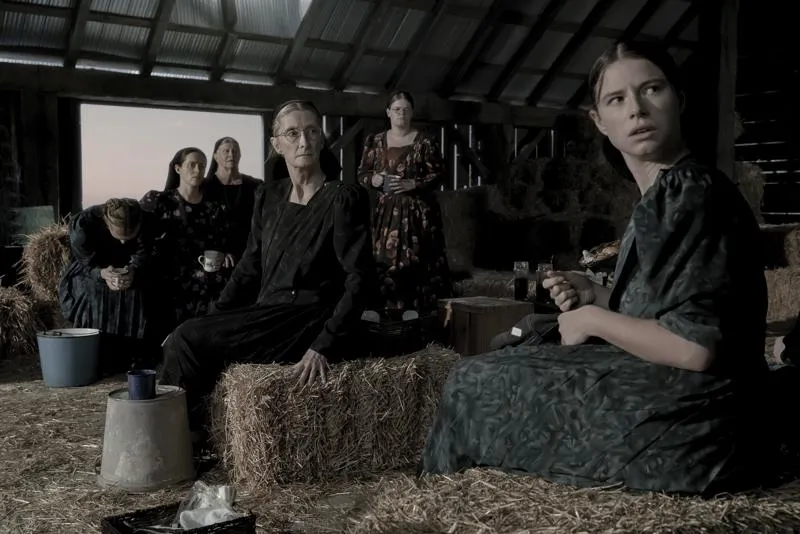
Women Talking thrusts us into a group of eight women from an isolated Mennonite colony who have learned that the men of their religious community have been drugging and raping their women, even teen girls, for years. A group of the women are now debating whether or not they should remain in the community or gather themselves and their children up to head elsewhere, assisted in documenting the debate by a lone male ally of the community named August (Ben Whishaw). The resultant conversations allow them to work through all of their emotions in the wake of their discovery and ultimately decide where their futures reside.
The structure of this film is that of a courtroom procedural, sans the courtroom setting. The best analog for it that comes to mind is the legendary 1957 film 12 Angry Men. Its story also features a group of people debating the fate and future of others, in this case themselves and their children as they seek to leave the abusive cult they’ve known for all of their lives. Each character reacts to their trauma in unique and deeply personal ways, through the anger shown by Mariche (Jessie Buckley) or Ona’s (Rooney Mara) stoic rationality or Janz’s (Frances McDormand) defiance, all the women personify the emotions that are fostered by being victimized through systemic abuse and the thoughts that go through someone’s mind when debating on whether it is finally time to leave and seek refuge from it. Writer/director Sarah Polley also utilizes flashbacks of the night the women came to realize they were being systemically assaulted to communicate the nature of their PTSD, an effective way of furthering the story and communicating the women’s mind states and how they have been effected.
Women Talking also raises questions surrounding forgiveness; who is it for? Who deserves it? The situation these women found themselves in is clearly one that most would agree does not deserve it, but the fact that many of the still devoutly Christian women feel the need to debate the possibility of accepting a simple but sincere apology from the men of their community with a promise to be better in order to stay at the compound illustrates the depth of both their faith and their indoctrination in the fundamentalist culture of their Mennonite community. The reality of what has happened to them clashes with their faith and watching this internal, philosophical tug of war play out onscreen as the women think these issues through aloud can be interesting for many in the audience. The film also utilizes a darker gray color grade that serves to illustrate both the mood of the women in the film as they deal with addressing the abuse and communicating the archaic nature of both the community’s culture and the treatment that the women face. Although this story takes place in 2010, the style of dress, architecture, and how things operate feel straight out of the 19th century with the cinematography reflecting this point.
Ultimately, the impact that Women Talking will have on each individual viewer will depend heavily upon their connection to its subject matter and themes examining sexual assault, religious faith, and forgiveness. In a cinematic marketplace that has heavily examined the abuses and mistreatment that women face post-#MeToo, I found Women Talking to lack anything new or substantively unique in what has to say on the topic. Sure, there are some quality performances, most notably from Buckley and Whishaw that cover the emotions women feel as victims and as the lone non-abusive male in a culture that encourages men to participate or look the other way, but despite the emotionality presented by the characters, there’s nothing new communicated in the dialogue heavy film that hasn’t been heard or discussed in numerous films released earlier this year, let alone in the past six. The setting and Mennonite community had potential to offer something different, but ultimately added little besides window dressing and the scenery for which the story was set. A scene that perhaps best encapsulates the line on which Women Talking teeters is when August teaches Ola about using celestial navigation to travel outside of the settlement by forming a fist against the Southern Cross star system. This metaphor for raised fists leading the women toward freedom is at once heavy handed, but also a clever bit of writing that impresses more than it annoys but is obvious nonetheless. Women Talking is an emotional film, but feels a bit too rote to offer any lasting compelling feeling.
Image: United Artists Releasing

